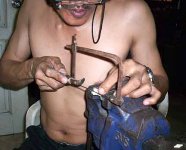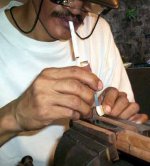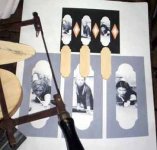olsonsview said:
I think part of the reason for poor cues being sold here is good old horsetrading. Instead of paying a fair price for a quality product, buyers haggle the price to death and expect primo quality, that only can go on so long before a craftsman has to become a crapsman to stay alive.
Unfortunately, you're correct. But this just doesn't happen in this craft. Just the same in the construction industry, if the owner doesn't specify in detail what brand is preferred the contractor might just use inexpensive brands on plumbing and elactrical fixtures, cabinets, carpet, etc. It happens everywhere and anywhere.
olsonsview said:
Another valid point is the severe differnce in climate. Cues made there are done so under very humid and hot conditions. The cuemakers there may be able to make a cue that "works" under those conditions and fails quickly when the wood trys to breathe our air.
That's only one factor and really is the easiest to deal with. There are other construction stages that contribute at a higher percentage than the above mentioned. And these are some of those that knowledgeable cuemakers take with them to the grave.
olsonsview said:
I accidentily stumbled into the poolfanatics forum and tried to discuss shaft finishing techniques with the craftsmen from the philipines. One of them politely pointed out the severe differences of climate and why some of my techniques would not work there. I suggest that unless a cue were crafted for a specific climate it may not be as reliable. There is a proper tool for every job my departed Father always said! And cues are the tools of pool players! Just a thought...
I understand what you're trying to convey. You're saying that the right tool is the one made where it's going to be used. Unfortunately, there is a wide temperature and humidity swing in the North American Continent. I know so because I lived there for almost 14 years. Even as a cuemaker, I like owning different cue brands and not necessarily for collecting. I and a friend bought a cue from a Southern state maker while I lived in Las Vegas and in 3 moths it was already warped and my friend's cue's A-joint started rotating. So your statement becomes invalid as the technology or crafting skills that can be applied to make a cue "the right tool" for any place in that continent can also be applied by craftsmen from any place in the world.
Consumers in North America probably wouldn't have taken interest in other continents' products if their local products were made available at a comparable price.
I was just discussing this with a friend this afternoon. When CNC was made available to cuemakers, most just utilized it tospeed up work or make them be capable of inlaying designs that one would normally see in production cues. I told him that it's sad that the capability of such an advanced technology can't be used at its fullest. As an example, take 2 cuemakers. One has cnc inlaying capability and one who does the inlays by hand. If they were both given 3 hours to inlay a cue, the hand inlay guy will submit a design concept where the CNC guy will blurt out "I can do that in an hour"! What should have been exclaimed is "I can do a lot better than that design in 3 hours".
IMO, CNC aided custom cuemakers should be able to push the creative envelope and do things that'll differentiate them from factory-made cues.


